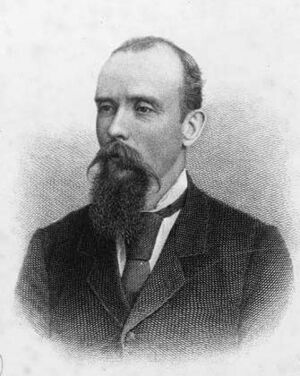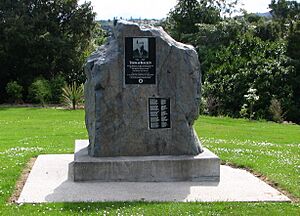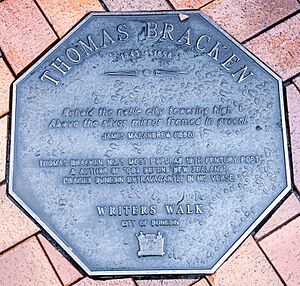Thomas Bracken facts for kids
Quick facts for kids
Thomas Bracken
|
|
|---|---|
 |
|
| Born | c. December 1843 Clonee, County Meath, Ireland |
| Died | 16 February 1898 (aged 54) Dunedin, New Zealand |
| Occupation | Poet, journalist, politician |
| Nationality | New Zealander |
| Citizenship | Irish-New Zealand |
| Notable works | God Defend New Zealand |
| Spouse | Helen Hester Copley |
| Children | Charles Copley Bracken |
Thomas Bracken (born around December 1843 – died 16 February 1898) was an Irish-born New Zealander. He was a talented poet, a journalist, and even a politician. He is most famous for writing "God Defend New Zealand", which is one of the two national anthems of New Zealand. He was also the first person to call New Zealand "God's Own Country".
Thomas Bracken's mother, Margaret, passed away in 1846. His father, Thomas, died in 1852. When he was about 12 years old, Thomas was sent to Australia to live with his uncle, John Kiernan, in Geelong, Victoria.
In Australia, Bracken first trained to be a pharmacist. Later, he worked on farms as a shearer (someone who shears sheep) and a drover (someone who moves livestock). For a while, he also searched for gold and ran a store. During this time, he started writing stories about the gold miners and the people who worked with sheep. He also started a business called Thomas Bracken and Co with Alexander Bathgate. They bought and ran a newspaper called the Evening Herald.
Contents
Literary Career and Famous Works
In early 1869, when he was 25, Thomas Bracken moved to Dunedin in New Zealand. There, a book of poems he had written in Australia was published. While working various jobs, he kept writing. He published a small book of poems called Flights among the Flax. This book caught the attention of people interested in literature, and he won a poetry prize from the Otago Caledonian Society.
Bracken was determined to become a journalist. He got a job at the Otago Guardian newspaper. While working there, he met John Bathgate. In 1875, Bathgate started a newspaper called the Saturday Advertiser. Its goal was to "foster a national spirit in New Zealand and encourage colonial literature." Bracken also wrote for the Morning Herald and a Catholic newspaper called The New Zealand Tablet.
Bracken became the editor of the Saturday Advertiser. He immediately started to encourage local writers. The newspaper's circulation reached 7,000 copies, which was a big success for that time. Because of this success, Bracken contributed some of his own writing, including funny stories, jokes, and poems. This included God Defend New Zealand, which was published in 1876 and later became the national anthem. He also wrote another famous poem called Not Understood in 1879.
Thomas Bracken often used pen names like Paddy Murphy and Didymus. However, his many works published under his own name became famous worldwide. He was well-known throughout Australia and New Zealand. Later, some of his works were published in collections like Flowers of the Freeland, Behind the Tomb and Other Poems (1871), The Land of the Maori and the Moa, Musings in Maoriland, and Lays and Lyrics: God’s Own Country and Other Poems (1893).
Bracken's Support for Māori Rights
Thomas Bracken supported the fair policies of Governor Sir George Grey. He strongly believed in the rights of the native Māori people. Later, he criticized the government because he felt they were not keeping their promises from the Treaty of Waitangi.
Bracken arrived in New Zealand when colonial troops were fighting in Te Kooti's War against Te Kooti. Te Kooti went into battle with his own special flag. This flag had three symbols that some people believe represented stars. Bracken's national anthem asks God to "guard Pacific’s triple star." Some historians think this line refers to Te Kooti's flag, showing Bracken's quiet support for Māori.
However, others suggest that "Pacific’s triple star" simply means the three main islands of New Zealand: Northern, Middle, and Stewart. These were the names used for the islands at that time. Bracken never explained what he meant, so we don't have a clear answer today.
Political Career
| New Zealand Parliament | ||||
| Years | Term | Electorate | List | Party |
| 1881–1884 | 8th | Dunedin Central | Independent | |
| 1886–1887 | 9th | Dunedin Central | Independent | |
Thomas Bracken was very interested in current events and politics. He ran for New Zealand Parliament in the City of Dunedin area in the 1879 election election, but he did not win that time.
Bracken successfully won the Dunedin Central area in the 1881 election election. He lost the seat by just three votes to James Benn Bradshaw in the 1884 election election. However, when Bradshaw passed away in 1886, Bracken won the 1886 by-election and returned to Parliament. He stayed in his seat until the end of that term in 1887, when he decided to retire from politics.
Later Life and Death
Thomas Bracken was not always careful with his money. He eventually faced financial difficulties. In May 1894, he took a job in Parliament as a "bill reader" (someone who reads proposed laws). However, his health got worse, and he had to leave Wellington and return to Dunedin.
Thomas Bracken passed away on the night of 16 February 1898. He is buried in the Dunedin Northern Cemetery. There is a lookout point nearby, which offers great views of the city, named in his honor.
See also
- New Zealand literature
 | Chris Smalls |
 | Fred Hampton |
 | Ralph Abernathy |



